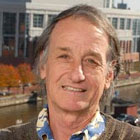Frank T. Robb, PhD, University of Maryland, Baltimore and the Institute for Marine and Environmental Technology (IMET)

Dr. Robb's main research interest is in hyperthermophiles that can survive and even thrive at temperatures up to 100°C (212°F), which in mere seconds can destroy DNA, "normal" proteins, and, hence, life. Dr. Frank Robb's main interest is learning specifically how these organisms can maintain stable proteins in the face of a thermal onslaught. His key focus is on heat shock proteins, known as chaperones, that the organisms produce to allow them to fold the proteins necessary for life. Robb and his colleagues are working toward various applications including using chaperones to improve high-temperature industrial or biomedical processes. The team, supported by the Bill and Melinda Gates Foundation, is exploring methods that seek to enhance the durability and immunogenicity of live vaccines through expression of heat shock proteins from thermophiles. If successful, the project will enable enhanced long term storage of vaccines in locations lacking refrigeration, for example in developing nations.
Products
References
- Sun, Y., N. Makarava, C-I. Lee, P. Laksanalamai, F. T. Robb and I. V. Baskakov (2008) Conformational stability of PrP amyloid fibrils controls their smallest possible fragment size. J. Molecular Biology 376(4):1155 - 1167.
- Luo H, Laksanalamai P, Robb FT. (2009) An exceptionally stable Group II chaperonin from the hyperthermophile Pyrococcus furiosus. Arch Biochem Biophys. 486:12-18.
- Kurouski D, Luo H, Sereda V, Robb FT, Lednev IK (2013) Deconstruction of stable cross-Beta fibrillar structures into toxic and nontoxic products using a mutated archaeal chaperonin. ACS Chem Biol. 2013 Sep 20;8(9):2095-101. doi: 10.1021/cb400238
- Laksanalamai P, Narayan S, Luo H, Robb FT (2009) Chaperone action of a versatile small heat shock protein from Methanococcoides burtonii, a cold adapted archaeon. Proteins 75(2):275-81



